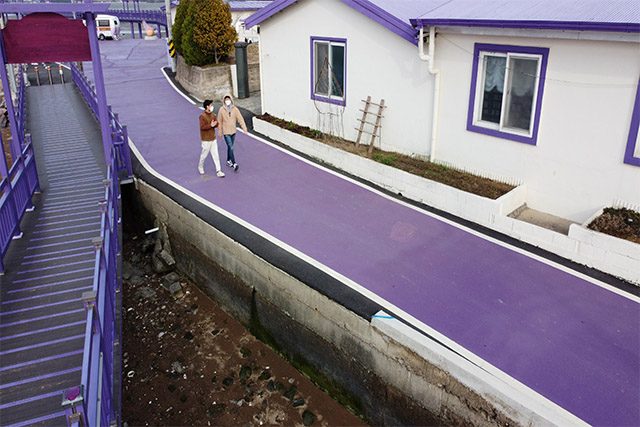
SHINAN, South Korea — Dressed all in purple, bent-over women held long rakes aloft as they walked in a line to a lavender field to carry out some pruning on an island in southwest South Korea.
Inspired by their native balloon flower, residents of the Banwol and Bakji Islands, known as the ‘Purple Islands’, have painted their houses, roads and bridges in shades of the hue, and planted purple flowers such as lavender and asters to transform their town into a tourist attraction.
“Old people like us have a secluded life here, since all the young people left the town,” said villager Shin Deok-im, 79, who has lived on Bakji island for more than 60 years.
“I’m glad to see young people and kids visiting to see our town. They are all like my grandchildren.”
The tiny, tranquil islands have a little over a hundred residents and were picked for a tourism project supported by the government.
Since 2015, Shinan county has invested 4.8 billion won ($4.25 million) to turn the islands purple, including painting more than 28,000 square meters of roofs lilac.
The campaign has drawn over 487,000 people since its official start in 2019, according to the county office.
Restaurants on the islands offer purple rice and serve food on purple plates. Some residents have taken to the purple project with gusto.
“Every morning I dress up in purple from head to toe, even including my underwear and shoes, and that makes me happy,” said 88-year-old resident Jung Soon-shim, sitting in a purple gazebo.
Visitors can walk three purple footbridges connecting the two islands to the larger one near it, with benches decorated with the ‘I purple you’ slogan made popular by K-pop band BTS’ member Kim Tae-hyung, more commonly known as V, which means ‘I trust, love and support you.’
Those wearing purple are even allowed free entry to the islands.
“We couldn’t travel overseas due to COVID-19, so we visited these purple islands instead,” said visitor Shin Eun-me.
“Seeing these grandmas wearing purple clothes is very dreamy.”
($1 = 1,129.95 won) —Reporting by Minwoo Park and Daewoung Kim; Editing by Karishma Singh



